- Home
- P. T. Deutermann
The Moonpool cr-3 Page 6
The Moonpool cr-3 Read online
Page 6
“That must be really slow.”
“It’s tedious, but reliable. It also requires a certain degree of technical openness. Nothing happens behind closed doors.”
“So?”
“So, if somebody tapped a source of radioactive water in the Helios plant, he would have to have violated all three wedges of technical security.”
I thought about the appearance of a tail on Quartermain’s visit out here today. “Would he need some help from the physical security department?”
He nodded. “Yes, I’d think so, and that’s the one division at Helios which is comparatively opaque. There’s a cast of dozens involved in bringing a reactor online and feeding the grid. But most of the time, nobody knows what the hell Trask’s people are doing.”
“Except following you around and breaking into my hotel room, presumably just because you and I met.”
“Well, there is that.”
“But I thought Trask worked for you-why not just fire his ass?”
“Truth?”
“Please.”
“My theory is that he’s got something on the director, because every time I’ve voiced my ‘concerns’ up the line, I get shut down. Can’t prove that, of course, but that’s what I’m beginning to think.”
“So you want us to take a look at them? Trask, his people, and any possible ties to the director?”
“Yeah.”
Before Quartermain could elaborate, Tony Martinelli came back into the kitchen from outside. He looked pleased with himself, which worried me a little bit. He saw the expression on my face and waved me off.
“It’s cool,” he said. “But not what I expected.”
“Ree-port.”
He looked at Quartermain and raised his eyebrows, as if to ask, Okay for him to hear this? I motioned for him to continue.
“Okay, so I go around the block, walk towards downtown for five minutes, turn around, and come back towards the house on the beachfront street. Just another tourist, out for some fresh salt air and a cigarette. And one block away, parked on the beach side of the street, I come upon a Bureau ride, complete with two specials sitting in the front seat trying to look inconspicuous.”
“In their suits and ties. At the beach.”
“But they were such inconspicuous suits.”
“Can you describe the agents-a man and a woman, perhaps?”
“Negative. Just the usual Buroids with the usual sunglasses and happy faces. They looked bored.”
“So lemme guess: You stopped, stared, waved, said hi-there, peed on their tires, and then took their pictures?”
Tony feigned profound disappointment. “Absolutely not, boss,” he said. “I never said hi-there. However, I did notice their parking meter was expired, so I sicced a meter maid on them.”
I had to grin. “And then watched them flash some creds.”
“Aren’t you proud of me?” As in, lots of other options had come to mind.
“I am, Tony, I am,” I said, counting myself lucky that he hadn’t crawled under some cars and attached a towing chain from their rear axle to a tree. He’d seen that in a movie and often said he’d like to try it.
“So, the question is: Who’re they watching?” Pardee asked, sticking as always to business.
“Great question,” I said, turning to Ari. “You, us, Trask’s snoops, or all of the above?”
“I have no idea,” he said.
“Well, let’s find out,” I said. “Why don’t you leave, and we’ll see if they follow you out of here. If they stay put, we’re the target. If not… But before you go, Pardee here is going to help us create a way we can communicate securely. In the meantime, Tony and I will step out for some more of that salt air.”
I left Pardee and Ari in the kitchen to sort out secure comms. I asked Tony to get us into a position from which we could watch both the house and the watchers when Ari drove off. Tony had parked his car behind the house, so we used that to get set up behind the Bureau vehicle in one of the metered spots on the beach.
After about five minutes, we watched Ari come down the front steps of our rental unit and go to his car. Don’t turn around and wave, Ari , I thought. Just get in and drive away. The mental telepathy must have worked because that’s what he did. We waited. The two agents were just silhouettes in the car parked ahead of us, but we could see one of them talking on a cell phone. Then they cranked up their Bucar and surprised us by executing a U-turn.
“Down ’scope,” I said, and we both slid down in the front seat of Tony’s car. When they had passed us, we drove back to the house.
Pardee had brought some electronics gear, including two laptops, which were running in parallel in his version of a baby supercomputer. Using these, he had created a Web site on which Ari and I could post and retrieve messages using a secure password system. He hosted the site on our office server back in Triboro, so there’d be a cutout.
He also reported that our office manager had closed out Allie’s affairs by notifying her ex-husbands of her demise and sending her personal office effects to the sister in Turkey, no matter what she’d said. Fortunately, there were no remains to deal with, as the federal government still had that problem bagged up in a lead-lined vault somewhere. It was personally disturbing to think about Allie being stored in a locker like a side of meat, but, as Pardee gently reminded me, that wasn’t Allie. I knew he was right, but still.
It was noon, so we went out to find a place for lunch. Southport had a decent selection of lunch places, and we found something suitable on the main drag. The beauty of a small tourist town was that no one paid the three of us the slightest bit of attention. You were either born there or you were “from away,” like the Yankees say.
After a quick bite, we left the cafe and walked back to the car. I heard Tony swear and saw the parking ticket under the wiper blade. Then I saw that the meter was green. He lifted a folded piece of paper, read it, and handed it to me. There was a single line that read: ET come home. Now would be nice. It was signed with a large letter C.
“Sneaky futher-muckers,” I said, looking around. Tony grunted and pointed, and there, across the street, was the Bureau car we’d watched drive away. Apparently, not very far away. The agents waggled fingers at us. Tony rubbed his nose with his middle finger in response. The agent driving the car put his hands up to his face in mock horror.
“Okay, let’s go back and face the music,” I said.
“Who’s C.?” Tony asked.
C., as I’d suspected, turned out to be Creeps himself, minus his ditzy assistant this time. The other agents had followed us back to the house and were now waiting outside, reading magazines. Creeps was standing on the front porch when we got there, so I was pretty sure he hadn’t been inside. The shepherds were in there, staring out the front windows and definitely not looking like Welcome Wagon material.
I introduced my two helper-bees, and then we all went in. Since Pardee had set up his computers in the kitchen, I invited Creeps to sit in the living room, which meant that he had to fit that gangly, Lincolnesque frame of his into one of the sandy wicker rocking chairs. Wicker apparently is the furniture of choice for a beach house; everything in the living room was made of it.
“Welcome to our humble rental unit,” I said. Pardee and Tony leaned on opposite sides of the living room entryway. “Have we been bad?”
Creeps rubbed his hands together while he thought about what he was going to say. “I certainly hope not, Mr. Richter,” he said, “but, given the nature of our last conversation in Wilmington, your Bureau just wanted to make sure you hadn’t returned to investigate Ms. Gardner’s, um, unfortunate demise.”
“You were quite clear, I thought,” I said. “Back out, stay out, and assist my Bureau in any way I can and should as a good citizen. Right?”
“Yes, indeed,” he said warmly, smiling his best undertaker smile. Given that he’d signed his little love note “C.,” he had to be putting at least some of that bullshit on. “So: What, may I as
k, are you doing down here with or for the technical security director of the Helios power station?”
“A job of work,” I replied, recalling Ari’s quaint phrase.
Creeps raised his eyebrows in a go-on expression.
“The details of which have not yet been made entirely clear,” I continued, fudging just a little. “Something to do with overlapping jurisdiction within the plant’s security apparatus. He’s the technical guy, and there’s a separate department that handles physical security. We’ll probably know more tomorrow.”
Creeps frowned. It took the frown a couple of seconds to spread across that huge, lachrymose face. “How does this bear on the Gardner case?”
Clever Creeps. You never knew where he was going with his questions, but he probably did, and all the time. “It doesn’t,” I said. “At least as far as we know. Besides, we’re not supposed to get involved in the Gardner case, remember? I guess you could talk to Mr. Quartermain.”
The frown vanished. “Oh, yes, indeed,” he said. “We’ll be talking to Mr. Quartermain, at some length, I suspect.”
“Well, while we’re on the subject of Allie Gardner, do you guys think that evil shit came from the plant or some other source?” I saw Tony and Pardee, who were standing out of Creeps’s line of sight, trying to suppress grins.
Creeps did a tsk-tsk number. “Mr. Richter, really,” he said disapprovingly. “I do hope you’re not intending to mess around with your Bureau. You know how we hate that. Although I can tell you this much: Right now, the NRC people don’t think the radioactive substance did come from Helios. There’s simply no way to do that without exposing the taker to the same radiation that would ultimately kill the takee, if you follow me.”
“Yeah, that occurred to me, too,” I lied. “But, honestly, I think Quartermain wants us for something totally unrelated. As I understand the politics of the situation, PrimEnergy wants to put some distance between what happened to Allie and the Helios station.”
Creeps nodded, but then changed the subject. “Under what modalities is Mr. Quartermain engaging H amp;S Investigations?” he asked.
I explained the contract money Ari said he had for security intrusion exercises. Creeps nodded again, as if he knew all about that program.
“You understand, Mr. Richter,” he said, “that those are federal dollars? And that any such intrusion exercises, whether force-on-force, tabletop war games, or otherwise, are supervised by the NRC? Which is itself a federal organization?”
“Makes sense,” I said. “But for us contractor weenies, a dollar is a dollar. We agree on a statement of work, a price, and the client’s boundary conditions. Then we do our thing, write a report, and send in the bill. As long as he can write the check, we don’t much care which budget line item governs the money.”
“Perhaps you should,” he said. “Because federal money brings federal oversight, and your Bureau is reasonably competent in the oversight department.”
“Oh, for God’s sake,” I said, tiring of the games. “We know the rules, Special Agent. I told Quartermain that if we stumble onto anything that faintly resembles evidence of a real security problem, we’re obligated to take it to you guys. Why don’t you ask him?”
“We certainly shall do just that,” he declared. “Allow me to be frank: What happened to Ms. Gardner might be a one-off, or it might be the first indication of a much more serious problem, one we’ve actually been anticipating, and with no little trepidation, I might add.”
I recalled what Ari had said. “You think someone’s finally managed to get something nasty through that big-ass container port upriver?”
That surprised him, and people didn’t surprise Brother Creeps that often. He wagged a long, bony finger at me. “You be very careful talking about that little theory,” he said. “You people intrude into anything along those lines, and you might find yourself languishing on a certain Caribbean island.”
I put up my hands in mock surrender. “Got it, okay? As I’ve said, we’re not quite sure what Mr. Quartermain has in mind for us.”
“For what it’s worth, Mr. Richter, we think he wants to use you, as a genuine outsider, to demonstrate that his technical security system is intact, and that, ipso facto, no radiological release ever occurred at Helios.”
“I thought the NRC was going to do some kind of isotope analysis. What happened to that?”
He thought about that for a moment, obviously trying to decide if it was prudent to tell us anything at all. Then he nodded. “Yes. Well. The initial analysis was inconclusive. The residual radiation in Ms. Gardner’s tissue has decayed along with the tissue.”
“Was that the only way they could prove the stuff came out of Helios?”
“The only technically conclusive proof, yes.”
It was my turn to think. It seemed to me that Quartermain was basically going on the offensive by bringing us in; the NRC wouldn’t be able to tag Helios with a radiological release. If we couldn’t find a hole in their security, then he’d done what the company wanted him to do-cover their corporate asses.
“What would be the consequences if someone were to discover, inadvertently, of course, that it did come out of there?” I asked.
“The NRC would shut them down, and then the real fun would begin, Mr. Richter. So take some care, and remember whose side you’re on when it comes to national security versus corporate liability. If there’s a dangerous hole in the plant’s security, and you spot it, I’d better know about it before Mr. Quartermain does, understood?”
I told him it was, and he levered himself out of the creaking wicker chair. He stared down at the floor for a moment, as if making sure it was going to hold him. Then he looked back at me. “We’re operating under different rules these days, Mr. Richter. The war against terror has seen federal law enforcement crossing some lines which we used to hold fairly sacred.”
“Meaning?”
“Meaning, these days, if you interfere, you can disappear.”
Then he left us.
I breathed a sigh of relief after letting him out the front door.
“Now that’s a weird m-f,” Tony said. “Does he always speak in code like that?”
I went back into the kitchen and sat down. “That wasn’t code, guys. There’s something seriously amiss down here, and this time, I think we’re going to have to play by their rules. If it weren’t for Allie’s involvement, I’d back us out of this right now.”
“Allie’s beyond caring, boss,” Pardee pointed out, “and we don’t know squat about a nuclear power plant. What exactly is it this guy wants us to do?”
I still wasn’t quite sure myself, so I went sideways. “Why don’t you bring up the site and see if we’ve got mail?”
He did and we did. One message from Ari. He told us to report to the Helios administration building to begin processing for vehicle passes and ID cards.
We took two vehicles. The shepherds and I went in my Suburban; Tony and Pardee went in Pardee’s black Crown Vic. My Suburban was a plain vanilla 2500 series with the rear seats flattened to accommodate the mutts. Pardee’s ride was every inch the cop car-tinted windows, souped-up mill, several antennas, and those all-rubber semi-slick tires engineered for extreme road-handling. I think he missed being in Major Crimes. Also he liked to speed, and that getup plus a few other secret signs and totems pretty much guaranteed a pass from the state police.
We took Highway 133 up to the plant’s main entrance and turned in. It was a beautifully landscaped entrance that gave onto a four-lane, undivided parkway. As we turned in we heard a low siren wail in the distance. It sounded like the shift-change whistle at a manufacturing plant. The road made a broad S-turn once we got past the main entrance, and then a second one lined us up with the main gates. Somewhat to our surprise, we found a squad of armed and flak-jacketed men arrayed across the gate area as we approached. I slowed the Suburban and lowered my driver’s side window. Tony pulled in right behind me. One of the guards stepped forward, while the othe
rs spread out their line, keeping what looked like Colt M4s at a loose port arms.
“Yes, sir, can we help you?” the guard asked, eyeing the two big dogs behind me. He was courteous, but warily so. I realized then that the siren had gone off when some invisible sensor detected unauthorized vehicles approaching the main gates. I explained that we were guests of Dr. Quartermain and that we were supposed to meet him at the pass office. The guard nodded and told us that this was the plant entrance and that the admin office was another half mile down the road. We’d apparently driven right by it. He showed us where we could U-turn and wished us a nice day. The line of armed guards had relaxed fractionally, but they were still in position to shoot the two vehicles to pieces if that need were to arise.
The admin building looked like every other admin building I’d been in. I told the guys to leave their weapons in their vehicle. I unstrapped my own. 45 and jammed it down between the seat and the center console. I set Frick up in a harness and leash rig and took her into the building with me. I lowered the windows and instructed Frack to guard the Suburban with his life. He promptly lay down for a nap.
Once inside, we were taken to Quartermain’s office, where we were met by a thirty-something brunette hottie who’d obviously been told to expect us. If she was impressed by the sight of two large and one medium-sized, very fit men, one of them being attached to an equally fit German shepherd, she gave no sign of it. She eyed Frick and said that the dog might present a problem. I told her that the dog was a service dog and that federal law required admission of such dogs if they were harnessed, leashed, and suitably trained.
She bent forward to address Frick. “Are you suitably trained?” she asked. Tony made a small noise in his throat when she bent forward, but Frick merely looked at her for a second and then just barely wrinkled her lip.
“Why yes you are,” the young woman said, straightening up. “We won’t mess with your dog.”
I had to admit that it had been fun watching her straighten up, and she also was no dummy. “The dog is just part of the act,” I said. “But: There is another one out front.”

 The Nugget
The Nugget The Hooligans
The Hooligans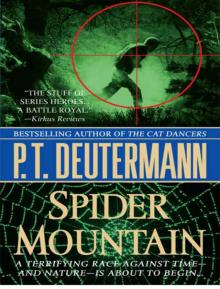 SPIDER MOUNTAIN
SPIDER MOUNTAIN![Cold Frame [retail] Read online](http://i1.bookreadfree.com/i/03/19/cold_frame_retail_preview.jpg) Cold Frame [retail]
Cold Frame [retail] Sweepers
Sweepers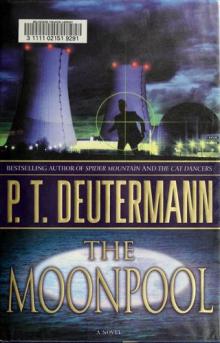 Cam - 03 - The Moonpool
Cam - 03 - The Moonpool Trial by Fire
Trial by Fire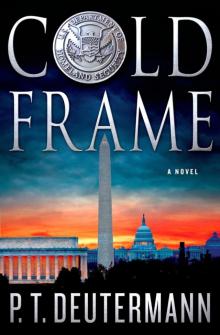 Cold Frame
Cold Frame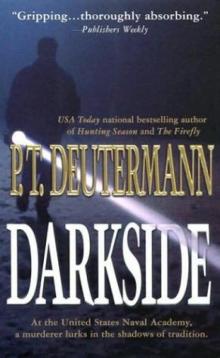 Darkside
Darkside Cam - 04 - Nightwalkers
Cam - 04 - Nightwalkers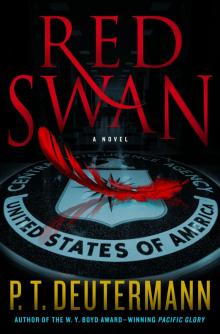 Red Swan
Red Swan The Commodore
The Commodore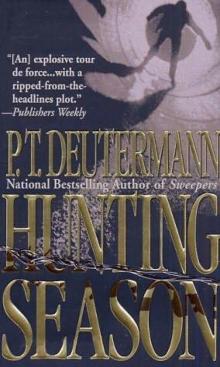 Hunting Season
Hunting Season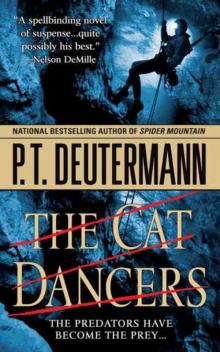 The Cat Dancers
The Cat Dancers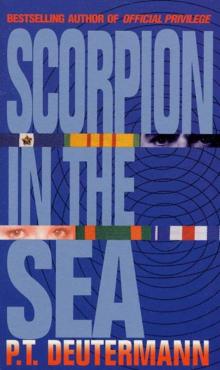 Scorpion in the Sea
Scorpion in the Sea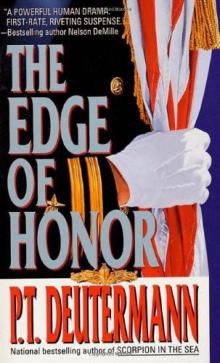 The Edge of Honor
The Edge of Honor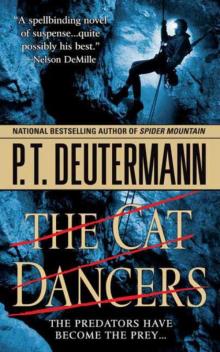 The Cat Dancers cr-1
The Cat Dancers cr-1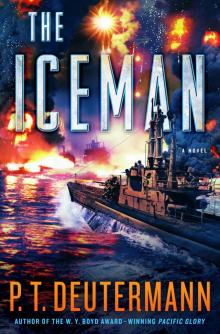 The Iceman
The Iceman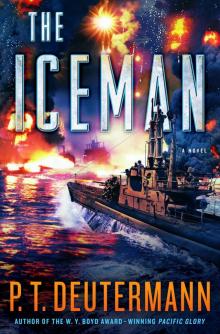 The Iceman_A Novel
The Iceman_A Novel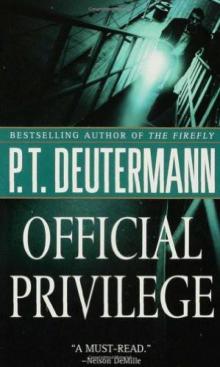 Official Privilege
Official Privilege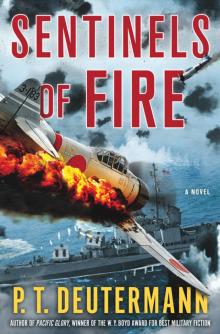 Sentinels of Fire
Sentinels of Fire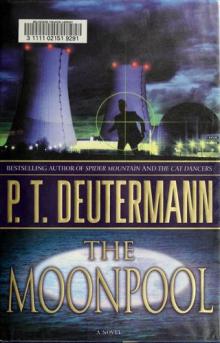 The Moonpool cr-3
The Moonpool cr-3 Nightwalkers cr-4
Nightwalkers cr-4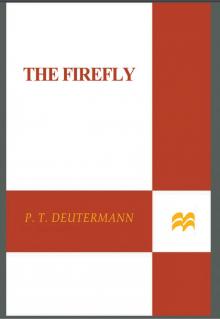 The Firefly
The Firefly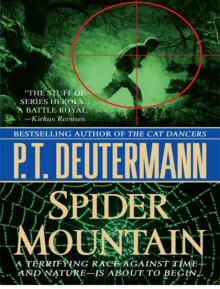 Spider mountain cr-2
Spider mountain cr-2 Pacific Glory
Pacific Glory The Last Man
The Last Man